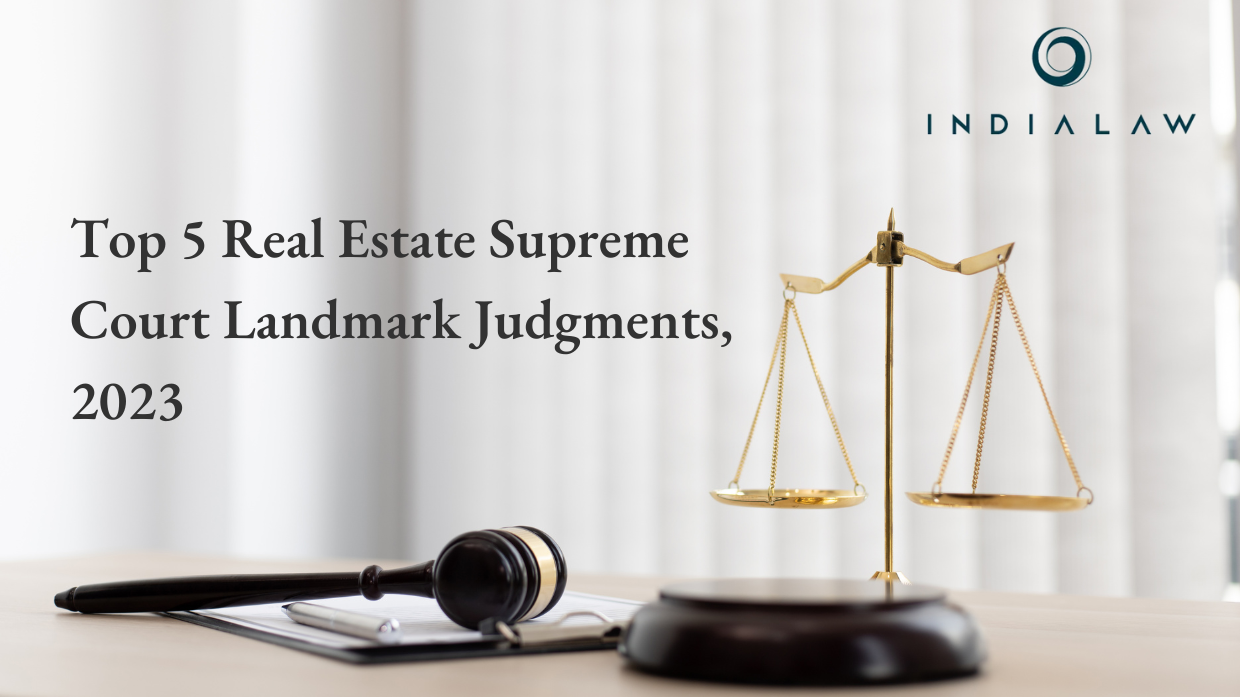Top 5 Real Estate Supreme Court Landmark Judgments, 2023

1. Supreme Court Clarified No Compound Interest Be Awarded Casually As Compensation by Consumer Forums in Real Estate Disputes
In April 2023, the Supreme Court (SC) in M/s Suneja Towers Private Limited & Anr. v. Anita Merchant[1] clarified that “For an award of compound interest, relevant factors shall have to be taken into account which would include uncertainties of the market and several other imponderables.” The Court highlighted that as per the proviso to Section 14(1)(d) of the Consumer Protection Act of 1986, (Act) the Forum is empowered to grant punitive damages if it deems fit.
Facts in brief
In the instant case, Anita Merchant (respondent) filed three complaints before the Consumer Disputes Redressal Forum (District Forum) alleging deficiency in service by M/s Suneja Towers Pvt. Ltd. (appellants). It was contended that the appellants had failed to deliver the possession of three flats booked by the respondent even after the expiry of the agreed period. The respondent had already paid 60% of the total sale consideration. The District Forum dismissed the complaints on the grounds that the complainant did not fall within the category of “consumer”, as defined under Section 2(d) of the Act.
An appeal was filed before the State Commission by placing reliance on Manjeet Kaur Monga v. K.L. Suneja[2] (‘Monga’s Case’), it granted relief to the respondent by directing the appellants to refund the deposit along with ‘compound interest at the rate of 14% from the date of deposit’. On appeal, the National Commission upheld the decision of the State Commission based on Monga’s Case decision. This led the appellants to approach the SC.
Decision of the SC
The SC set aside the order passed by the State and National Commission. It added that in Monga’s Case compensation was sought under the Monopolies and Restrictive Trade Practices Act (MRTP Act), whereas in the instant case it was sought under the Consumer Protection Act, 1986. The Court directed the respondent to retain Rs. 2,48,52,000 along with the accrued interest already paid by the appellants. However, it added that no further payment be made to the respondent by the appellants in lieu of refund, compensation or interest.
Conclusion
The SC highlighted that a compound interest cannot be awarded without considering material factors, in-depth analysis of all facts, uncertainties of market, etc. in real estate disputes. In this case, the Court specifically stated that granting compound interest to the respondent would cause unjust enrichment, that the Consumer Fora has sufficient powers under the Act to grant punitive damages.
2. Supreme Court Clarified Title of Immoveable Property Cannot Get Transferred Through Unregistered General Power of Attorney or Agreement to Sell
In June 2023, the Supreme Court (SC) in the case of Ghanshyam v. Yogendra Rathi[3] highlighted that Agreement to Sell, Will and General Power of Attorney (GPA) cannot confer title or rights in an immovable property. It cannot override the statutory requirement to execute a document for transfer or registration to derive right or title in an immovable property.
Facts in brief
Ghanshyam (appellant) owned a property in Delhi (suit property). He entered an agreement to sell with Yogendra (respondent) for sale of suit property and received the complete sale consideration. The appellant executed a Will and a GPA in favour of the respondent. The possession was handed over to the respondent, but no sale deed was executed between them. The respondent granted permission to the appellant to use a certain area of premises (licensed premises) for three months, however, he continued to occupy it post termination of the license period.
An eviction suit was filed by the respondent against the appellant, and he also sought mesne profits (claim of a property’s lawful owner against an unlawful possessor of that property). The respondent claimed ownership over the suit property based on an Agreement to Sell, GPA, a memo of possession, payment made for the sale, and the Will.
The appellant contended that the documents relied on by the respondent were manipulated, however, he did not dispute the execution of the documents, or receipt of sale consideration.
The Trial Court rejected the appellant’s claim of documents manipulation and affirmed the respondent’s right over the suit property. It granted an eviction decree and asked the appellant to pay mense profits to the Respondent as a licensee. An appeal was filed before the High Court (HC) and the HC concluded that the appeal involved no substantial question of law.
Observation of the SC
The SC highlighted that although Agreement to sell would not confer absolute title over the suit property to the respondent, but it would determine his possessory rights which shall be protected in view of Section 53A of the Transfer of Property Act (TPA). Section 54 of the TPA defines sale as a transfer of ownership in exchange for a price paid or promised or part-paid and part-promised. The SC underscored a crucial principle of Registration Act and Property Laws that the transfer of title in immovable properties cannot be effectuated through an Agreement to Sell.
Decision of the SC
Considering the above facts, the respondent obtained possessory title over the suit property, and the appellant cannot continue occupying the premises post termination of the licensed period. The SC upheld the eviction decree and order for mesne profits.
Conclusion
The SC’s verdict has a significant milestone in the property laws in India, as the Court clarified that rights and title over immovable property can only be transferred through execution and registration of a deed of conveyance or transfer document. It further highlighted that unregistered Agreement to Sell is not valid transfer documents, and execution of the same would not transfer right, title, and interest in immovable property.
3. Supreme Court Gives Clarification on Transfer of Actional Claims
In October 2023, the Supreme Court (SC) in Infrastructure Leasing and Financial Services Ltd. v. HDFC Bank Ltd. & Anr.[4] clarified on the legal stance pertaining to transfer of actionable claims. This ruling emerged from a dispute between Infrastructure Leasing and Financial Services Ltd. (IL&FS) and HDFC Bank Ltd. (Bank), on the point of the documents executed by IL&FS by which rents were made over to the bank constituted an assignment and thus fell outside the scope of an asset and security freeze order made by the NCLAT.
Facts of the case
The HDFC bank (respondent) gave Rs. 400 crore credit facility to IL&FS (appellant), governed by “Master Facility Agreement” (MFA)thatintendedthe opening of an escrow account with Housing Development Finance Corporation Bank Ltd.
Simultaneously, an “Assignment Agreement” (AA) was also executed between the parties, assigning the authorized indebtedness to the respondent from the gross income derived from the Business Centre Services/Lease/Leave and License Agreements (various agreements). A dispute between the parties occurred that led to the initiation of legal proceedings.
The National Company Law Appellate Tribunal (NCLAT) issued an asset freeze order against the appellant’s assets and securities. Being aggrieved by the order of the NCLAT an appeal was filed before the SC.
The issue before the SC was whether the rents payable by the appellants would be considered as an assignment.
Decision of the SC
On an analysis of the agreements entered between the parties, the SC concluded that the documents executed by the appellant was an assignment. It added that as per the MFA the rents receivable by the appellant were the security for advance extended to the respondent. That the AA specifically mentioned that the rents receivable by the appellant would be assigned to the respondent. The use of terms ‘security’ and ‘pledge’ in the agreement clearly established that there was an assignment.
The SC further examined the legal nature of Lease Rental Discounting (LRD). It observed that although the agreements were not termed “LRD”, the parties intended to assign the debt, including the rent payable.
The SC placed reliance on Section 3 of the Transfer of Property Act, 1882, (TPA) that defines the term ‘actionable claims’ as claims related to unsecured debts and beneficial interest in movable property and both are enforceable. Further, it stressed that Section 130 of the TPA provides the way actionable claims can be transferred.
Decision of the SC
The SC concluded that the rents payable by the appellant received through its tenants, lessees, and licensees would constitute debts that needed to be transferred to the respondent. It held that the agreements executed between the parties would constitute assignment but would not be subject to the asset freeze order.
Conclusion
The SC’s verdict sets a significant precedent in the legal landscape. The Court has affirmed the transferability of actionable claim by underscoring the importance of precise legal documentation in financial agreements.
4. Supreme Court Clarified Pre-Deceased Son’s Widow Cannot Claim First Right Over Mother-In-Law’s Share in Joint Property
In November 2023, the Supreme Court (SC) in Sachidhanandam (through legal representatives) v. E. Vanaja And Ors.[5] clarified that according to Sections 15 and 16 of the Hindu Succession Act (Act), the wife of a pre-deceased son cannot have first claim in mother-in-law’s share of the joint family property.
Facts of the case
E Vanaja, respondent no. 1 (plaintiff in the original suit) was the widow and the sole heir of Elango, the third son of Nallathambi Chettiar whose property was in dispute whereas the appellants (defendants in the original suit) were the widow, sons and daughters and grandsons of the Nallathambi Chettiar. The dispute was related to the ownership and distribution of properties listed in schedules B, C, and C1 (suit properties). Respondent No. 1 had originally filed a suit for partitions and claimed mense profits.
The Trial Court held that the properties listed in schedules B and C (not C1) were joint family properties, and the respondent was entitled to a 1/8th share. On appeal, the First Appellate Court revised the decision and held that the respondent was entitled to a 1/16th share in B and C1 schedule properties. It added that C schedule properties were not joint family properties due to its acquisition and hence not subject to partition.
In second appeal, the HC held that all three were the joint family properties and on death of the respondent’s husband and mother-in-law, she would be entitled to a 1/7th share out of 1/8th and 1/16th of her mother-in-law’s share in the B, C, and C1 schedule properties respectively.
Decision of the SC
The SC clarified that the claim pertaining to C scheduled property:
- The evidence available showing the properties was in usage and in joint possession by both the parties;
- Hence, even if the properties were self-acquired those were joint family properties for being in joint possession by both the parties.
The Court reconsidered the HC’s decision in the light of Sections 15 and 16 of the Act and it held that the HC was incorrect to allot 1/16th share to the respondent no. 1 from mother-in-law’s share.
The Court stressed that on a conjoint reading of Section 15(1)(a) and Section 16 of the Act, it is evident that a female Hindu dying intestate, her property would devolve firstly, on to sons, daughters (including descendants of any deceased son or daughter), and the husband. Hence, the widow of a pre-deceased son, was not the first claimant and hence, she could not inherit any portion of her mother-in-law’s share.
Conclusion
The Court has given significant clarification regarding the claim of a widow of a pre-deceased son in her mother-in-law’s share in a Hindu Joint Family Property. The SC highlighted that Sections 15 and 16 of the Act provide that the property of a female Hindu dying intestate shall devolve according to the rules provided under Section 16. Further, it stressed that Section 15(1)(a) says that devolution of property shall be firstly, upon the sons and daughters (including the children of any pre-deceased son or daughter) and the husband.
5. Supreme Court Clarifies on Right in Hindu Joint Family Property of a Child Born out of Invalid Marriage
In September 2023, the Supreme Court (SC) in Revanasiddappa v. Mallikarjun[6] discussed the rights of a child born out of an invalid marriage in a Hindu joint family. The SC dealt with the issue whether a child born from an invalid marriage can claim a share in the ancestral property of the Hindu joint family.
Facts in the case
Defendant no.1 had two wives- third plaintiff (the first wife) and the fourth defendant (the second wife). He had two children from the first wife, i.e. the first and second plaintiffs; and another two children from his second wife, i.e. second and third defendant.
His first wife and her two children had filed a suit for partition and separate possession against the defendants for their 1/4th share each with respect to ancestral property which had been given to Defendant no.1 by way of grant. The plaintiffs contended that Defendant no.1 had married the fourth defendant while his first marriage was subsisting and, hence, the children born from the second marriage would not be entitled to any share in the ancestral property of Defendant No.1 as they were not coparceners.
Decision of the SC
The SC stressed that a child should not suffer due to their parents’ invalid marriage and denying them share in property would be detrimental to their welfare. Section 16(1) of the Hindu Marriage Act provides legitimacy to children born out of marriages declared void, further Section 16(2) states that in a voidable marriage that is subsequently annulled, a child who is born before the annulment is deemed to be legitimate.
The Court clarified that the child’s rights are limited to parents’ property, and they do not possess the right to claim other coparcenary shares.
Conclusion
The SC provided much-needed clarity on this contentious issue by underscoring that every child has a right to inherent their parental property according to the Hindu law. The decision has far-reaching impact departing from the traditional interpretation of Hindu law. The judgment marks the relevance of protecting the rights of children by ensuring their access to parental property.
[1] 2023 SCC OnLine SC 443
[2] (2018) 14 SCC 679
[3] Civil Appeal Nos. 7527-7528 of 2012
[4] CIVIL APPEAL NO(S). 4708 OF 2022
[5] (2023 INSC 984)
By entering the email address you agree to our Privacy Policy.



